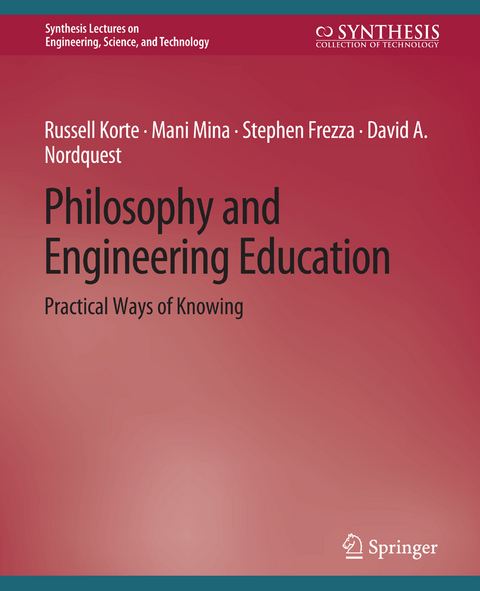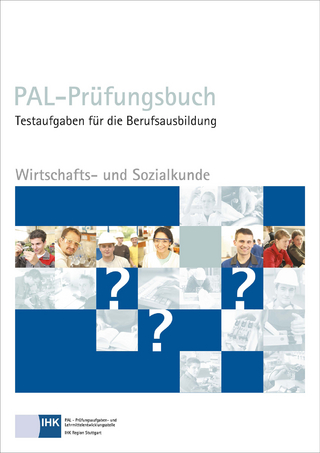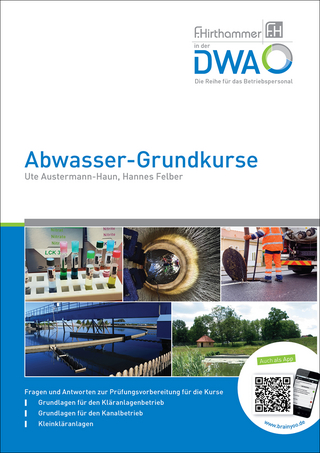
Philosophy and Engineering Education
Springer International Publishing (Verlag)
978-3-031-79195-6 (ISBN)
Russell Korte is an Associate Professor of Human and Organizational Learning at the George Washington University. Dr. Korte studies the socio-cultural systems in organizations and their effects on learning and performance in school and the workplace. This work focuses on the professional socialization of engineering students, faculty, practicing engineers, medical students,and teachers. Prior to GW, Korte was at Colorado State University and the University of Illinois at Urbana-Champaign where he helped redesign the first-year engineering program as a Fellow with the Illinois Foundry for Innovation in Engineering Education and was a member of the Academy for Excellence in Engineering Education-a faculty development program at the University of Illinois. Earlier, he was a research assistant for the Center for the Advancement of Engineering Education at the University of Washington. Korte received his Ph.D. in work and human resource education from the University of Minnesota. Past work experiences include several years in business and consulting. Additional research interests include theory, philosophy, social science, workplace learning and performance, socialization, professional education, and organization studies. Mani Mina received B.S. and M.S. degrees in physics, and M.S. and Ph.D. degrees in electrical engineering from Iowa State University, Ames, in 1982, 1985, 1987, and 1989, respectively. He is an Associate Professor at the Departments of Electrical and Computer Engineering, and Industrial Design at Iowa State University. He worked in industrial areas of instrumentation, system integration, and design in nondestructive evaluation and handheld systems. He is also engaged in research in Engineering Education. From the position of a reflective practitioner, he is working on ways of creating new approaches to bring cycles of empathy in engineering education. His work in engineering education and technological literacy has always been informed with a philosophical basis. He is influenced by the philosophical approach of John Dewey. He has received awards and recognitions from ASEE TELPhE (Technological and Engineering Literacy and philosophy of Engineering) and ECE (Electrical and Computer Engineering) divisions for his continuations to the fields and educational innovations. Deacon Stephen T. Frezza, Ph.D., P.S.E.M is a Professor of Software Engineering and Chair of the Computer and Information Science Department at Franciscan University at Steubenville. He earned his Ph.D., M.S., and a B.S. degrees in Electrical Engineering from the University of Pittsburgh. As a Professional Software Engineering Master (PSEM), he remains actively involved in developing practical industry-university projects and partnerships. He teaches a variety of software engineering topics, primarily in the area of requirements engineering, project management, software testing, and embedded systems. He is also actively engaged in global software engineering efforts. His research interests are in the areas of philosophy of engineering, affective-domain assessment, competency modeling and assessment, software engineering education, and the relationship between engineering and theology. Dr. Frezza is a senior member of the IEEE Computer Society (IEEE-CS), a professional member and division officer for the Technology and Engineering Literacy/Philosophy of Engineering (TELPhE) division of the American Society for Engineering Education. David A. Nordquest, Ph.D. is a member of the Philosophy Department of Gannon University. He received an M.A. and Ph.D. from Duke University, where he specialized in Political Philosophy. His research has centered around the philosophy of consciousness and practical epistemology. He has published research viewing constitutionalism from a cognitional perspective and exploring Lonergan's attempt to found a critical human science. Most recently, he taught a senior honors seminar on the philosophy of consciousness in Polanyi, Voegelin, and Lonergan. He participated for several years in seminars offered by the Lonergan Institute in Washington, DC and regularly teaches philosophy of knowledge courses from a Lonerganian perspective.
Series Foreword.- Preface.- Acknowledgments.- Implications of Pragmatism and Practice Theories for Engineering Practice.- John Dewey's Philosophical Perspectives and Engineering Education.- From Dewey to Lonergan.- Engineering Insight: The Philosophy of Bernard Lonergan Applied to the Engineering Knowledge Generation.- Authors' Biographies.
| Erscheinungsdatum | 06.06.2022 |
|---|---|
| Reihe/Serie | Synthesis Lectures on Engineering, Science, and Technology |
| Zusatzinfo | XVII, 58 p. |
| Verlagsort | Cham |
| Sprache | englisch |
| Maße | 191 x 235 mm |
| Gewicht | 171 g |
| Themenwelt | Sozialwissenschaften ► Pädagogik ► Berufspädagogik |
| Technik ► Maschinenbau | |
| ISBN-10 | 3-031-79195-9 / 3031791959 |
| ISBN-13 | 978-3-031-79195-6 / 9783031791956 |
| Zustand | Neuware |
| Informationen gemäß Produktsicherheitsverordnung (GPSR) | |
| Haben Sie eine Frage zum Produkt? |
aus dem Bereich


